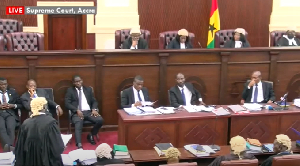Opinions of Saturday, 30 January 2016
Columnist: Okoampa-Ahoofe, Kwame
Prof. Adei’s Case against Kwame Nkrumah
By Kwame Okoampa-Ahoofe, Jr., Ph.D.
Garden City, New York
Dec. 23, 2015
E-mail: okoampaahoofe@optimum.net
The length of the period during which postcolonial Ghana’s first leader ruled the country continues to be hotly debated. Those who date his leadership from 1951, when he first won the election that saw him being released from prison and crowned Leader of Government Business by the British colonial Governor (LGB), claim that Mr. Kwame Nkrumah ruled the country for some 15 years. He would shortly petition the colonial authorities to have his position and title re-designated as Prime Minister.
It is debatable because during this transitional period, which did not actually end until 1961, when the Governor-General departed the shores of Ghana as Her Majesty’s local imperial representative, Prime Minister Nkrumah had absolutely no control over the country’s foreign policy and defense; and I strongly suspect the British colonial administrators also wielded a lot of power and influence over the financial affairs of the country.
It is rather paradoxical, to speak much less about the inescapably ironic, but it was during this period that the country’s full-suit of seminal development projects was laid. This was also quite a turbulent period in the political culture of the country, with the polar centers divided between those who believed in Soviet and Chinese styles of socialism and communism, respectively, and those who staunchly believed that the healthiest path to the country’s socioeconomic development lay in the dogged pursuit of a free-market economy.
The latter group was spearheaded by Dr. J. B. Danquah, the putative Doyen of Gold Coast and Modern Ghanaian Politics, who believed in the indigenous adaptation of capitalist economic policies and an equally dogged pursuit of democratic accountability and what he termed as the Liberty of the Individual or Individual Liberty. On the other hand, Kwame Nkrumah championed the pro-China and pro-Soviet brand of State Capitalism, erroneously called Socialism, in which an elite class of bureaucrats and political party machine operatives presumed to be best positioned to look towards and after the interests of the collective membership of the polity.
Well, global economic events during the last 30 years have vindicated the group fiercely championed by the University of London-trained Dr. Danquah. Which may clearly explain why Prof. Stephen Adei, the retired Rector of the Ghana Institute of Management and Public Administration (GIMPA), strongly believes that one great drawback to Nkrumah’s otherwise progressive agenda for the development of the country inhered in the fact of Nkrumah’s having unwisely allowed himself to be sidetracked by socialist philosophies (See “Nkrumah was one of Ghana’s Worst Leaders, Prof. Adei” Citifmonline.com / Ghanaweb.com 12/9/15).
The fact of the matter is that it was not essentially his inordinate penchant for socialist ideology that hobbled or militated against the agenda of the Ghanaian leader’s development agenda; for even Ghana’s imperialist overlord, Britain, had a socialist-oriented government, represented by the Labor Party, at the helm of its affairs. Rather, it was Nkrumah’s oversized ego that motivated him to want to immediately cannibalize and politically dominate the leadership of the rest of the African continent that ensured that Ghana would not realize its fullest potential, in terms of a well-focused development agenda.
In other words, Nkrumah had put too much chunk of political meat on his plate than he was capable of chewing. And with the latter tack towards his leadership orientation went quite a remarkable percentage of the country’s economic resources. The dictatorial culture of silence created and harshly fostered by the Convention People’s Party (CPP) leadership, also meant that the creative talents and the entrepreneurial acumen of the Ghanaian citizenry would be myopically stifled. This approach to leadership would be pursued by Chairman Jerry John Rawlings for most of the two decades that he literally ruled the roost. This, in essence, is the narrative of the epic chain of disappointments that has characterized the greater bulk of postcolonial Ghanaian political history.
Regarding the decidedly scandalous nature and temperament of African leaders, this is what Prof. Adei, among a host of other equally damning things, has to say: “They are worse than iron fists. They may not be harsh and brutal in their killing of people, but they are stealing money and doing everything else. In fact, our people [i.e. leaders] are [often too] strong in the wrong direction.”
*Visit my blog at: kwameokoampaahoofe.wordpress.com Ghanaffairs












